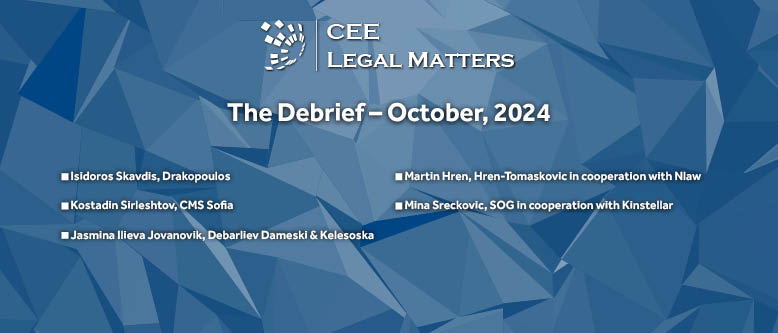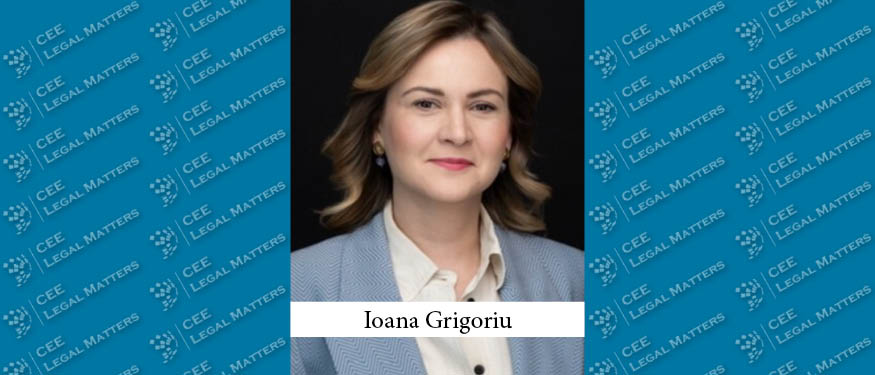In The Debrief, our Practice Leaders across CEE share updates on recent and upcoming legislation, consider the impact of recent court decisions, showcase landmark projects, and keep our readers apprised of the latest developments impacting their respective practice areas.
This House – Implemented Legislation
A significant development in the Greek corporate and M&A market, according to Drakopoulos Associate Isidoros Skavdis, is the enforcement of Law 5122/2024, which came into effect on July 19, 2024. The law, inter alia, transposes “article 1 of Directive (EU) 2019/1151 as regards the use of digital tools and processes in company law and the disqualification of directors,” Skavdis notes.
Skavdis points to specific provisions “aiming at ensuring transparency and at protecting the interests of all persons interacting with companies or their branches against any fraudulent or abusive behavior.” They introduce “a special Register of Disqualified Directors where all individuals/directors who must be excluded from the management of corporate affairs of companies and branches are listed,” he says, adding that the register “is maintained and administered by the Greek General Commercial Registry.”
In this context, Skavdis explains that “any individual falling within the scope of ‘disqualified director,’” cannot be appointed “as director, liquidator, and/or legal representative/proxy of companies or branches and, if appointed, such appointment shall be void.” The duration of a disqualification, according to him, “is imposed by a final court decision, and depends on the gravity of the offense committed.”
Hren-Tomaskovic in cooperation with Nlaw Managing Partner Martin Hren reports that “on July 27, 2024, Croatia implemented the Corporate Sustainability Reporting Directive into national law by amending the Accounting Act, Audit Act, and Capital Markets Act. These amendments establish timelines, reporting obligations, and audit requirements for companies operating in Croatia.” The scope of corporate sustainability reporting requirements “encompasses large EU companies, listed SMEs, and non-EU entities with significant operations in the EU,” he says, adding that “companies are required to include a section in their management reports detailing sustainability impacts and risks.”
“The sustainability reports will undergo mandatory limited assurance conducted by a certified auditor authorized to provide audit services in Croatia, or by an auditor from another EU member state registered with the Croatian Ministry of Finance,” Hren adds. “The Croatian Financial Services Supervisory Agency will supervise compliance and impose penalties ranging from EUR 1,320 to EUR 13,270 for companies and EUR 660 to EUR 2,650 for responsible persons within the companies for violations.”
One of the hot recent topics in North Macedonia’s competition landscape, according to Debarliev, Dameski & Kelesoska Partner Jasmina Ilieva Jovanovik, “is the start of the full implementation of Law on the Prohibition of Unfair Trading Practices in the Agricultural and Food Supply Chain,” adopted in March 2024. “Companies had six months to adapt their businesses and be fully compliant with the law as of September 28,” she explains. “The law reflects the EU Directive 2019/633,” Ilieva Jovanovik notes, and “its implementation would not make a big fuss if the local legislators did not add an original ‘hot’ spice to it.” The novelty of the national law “is the limitation of all rebates between suppliers and buyers in the chain of agricultural and food supply up to 10% of their mutual annual turnover.” The 10% cap of all rebates, she says, “is unique, and no EU country has similar practice or experience.”
Consequently, “the most frequent question the food suppliers and buyers have these days is how to re-define and structure their commercial rebates in the new contracts, to be fully compliant with the 10% cap,” Ilieva Jovanovik says. An even bigger challenge, according to her, “is defining rebates policies, after the announcement of the new Government decision adopted on September 20, 2024, introducing a 10% limit of the ‘gross profit margin’ in the wholesale and retail of basic food products which are already covered within the law as well.” Ilieva Jovanovik states that finding “the aggregate solution for the 10% rebates cap and maximum 10% gross profit margin” is quite challenging.
In the Works
SOG in cooperation with Kinstellar Head of Corporate, M&A, and Private Equity Mina Sreckovic emphasizes the partnership between Serbia and France, which has sparked significant infrastructure and environmental projects. The past month was “marked by the signing of 12 cooperation agreements between Serbia and France,” Sreckovic explains. The agreement includes “a focus on critical raw materials, with Serbia and France signing a partnership to explore and mine lithium, a vital component for batteries and renewable energy technologies.” Furthermore, for the infrastructure sector, she points out that “the signing of the contract for the procurement of Rafale aircraft and the agreement on cooperation in the construction of critical energy projects is crucial,” together with projects “focusing on nuclear energy, waste management, and wastewater treatment – which demonstrate Serbia’s commitment to modernizing its infrastructure, adopting sustainable environmental practices and energy diversification.”
Sreckovic further highlights a wastewater treatment project: “French companies Suez International SAS and Vinci Construction Grands Projets signed an agreement with Serbia to design, construct, finance, operate, and maintain a wastewater treatment plant in Veliko Selo. This facility – expected to treat 423,000 cubic meters of wastewater daily – will serve over 1.5 million residents,” and has “an estimated cost of EUR 700 million.”
CMS Sofia Managing Partner Kostadin Sirleshtov highlights that Bulgaria’s energy and infrastructure sector has been under international focus over the past month. “At the beginning of September, the Bulgarian Ministry of Transport and Skoda signed a contract for the delivery of twenty electric multiple-unit trains, financed under the Recovery and Resilience Plan,” he says. “The value of the rolling stock is BGN 511.4 million and the delivery period is two years. This is the first such contract for 20 years and will contribute substantially to the conditions of the Bulgarian railways.”
Additionally, Sirleshtov mentions that the Bulgarian government approved two intergovernmental agreements with Japan and Korea, “streamlining the reconstruction of the Chaira pumping hydro station by its original provider of equipment – Toshiba Corporation and the construction of Units 7 and 8 of the Nuclear power plant Kozloduy by Hyundai following the Westinghouse AP 1000 technology.”
Sirleshtov further adds that the Ministry of Energy announced a tender procedure “to provide funding for the construction and implementation of at least a 3,000-megawatt stand-alone battery storage facility with the total amount of the grant that can be provided under the entire procedure is EUR 590 million.” Each undertaking, he notes, “can bid for up to EUR 76 million in grant support with a deadline for submitting applications being 17:00 on November 21, 2024.”
Done Deals
In terms of finished projects, Sirleshtov highlights that “Greenvolt closed its second renewable energy deal in Bulgaria by acquiring Greenvolt Next Bulgaria JSCo from Greystone Bulgaria, thus securing a pipeline of rooftop PV projects.”
Regulators Weigh In
Ilieva Jovanovik draws attention to the growing importance of North Macedonia’s Commission for Protection of Competition in ensuring that the recently adopted Law on the Prohibition of Unfair Trading Practices in the Agricultural and Food Supply Chain is “enforced in a manner consistent with its intended regulatory objectives.” Ilieva Jovanovik adds that the commission’s role “will extend beyond the regular oversight, requiring it to address the differing relations that have emerged during the pre-enforcement period,” and hopefully, “provide the much-needed direction and clarity by establishing practical frameworks for the law’s operation within the supply chain.
This article was originally published in Issue 11.9 of the CEE Legal Matters Magazine. If you would like to receive a hard copy of the magazine, you can subscribe here.
















